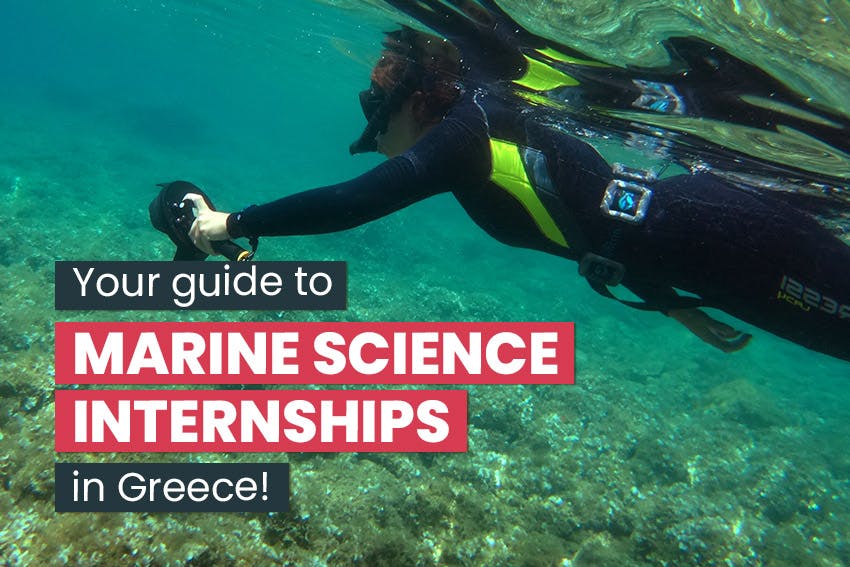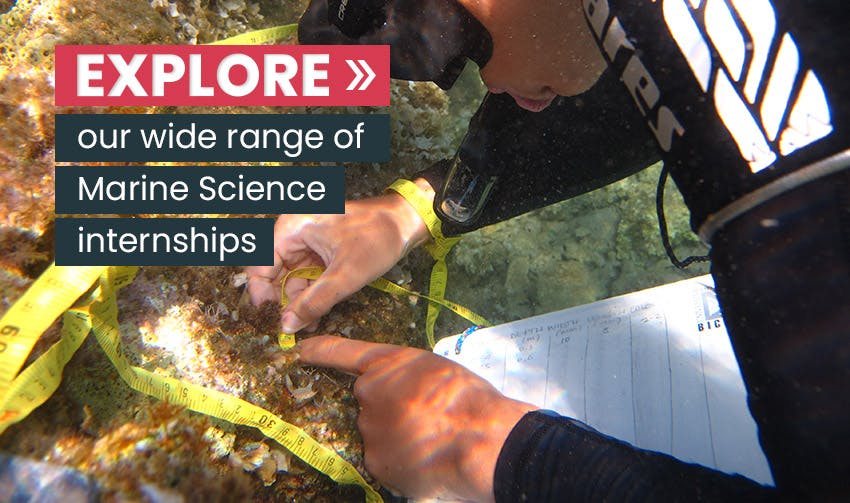If you’re looking for marine science or marine biology internship opportunities, you’ve come to the right place! RISEWAYoffers multidisciplinary internships for students and young professionals which are designed to provide the experience needed to sharpen your practical know-how.
Whether you’re seeking a career in conservation, environmental advocacy, or marine science, the Aegean Marine Science & Island Conservation internship caters to broad interests and experience levels. As one of our most popular internship choices, spaces fill up quickly every year!
To give our internship applicants more insight into what this fantastic career-building experience entails, we sat down with local coordinators to share more details…
Hi Lauren! How did you get involved with the team at this marine conservation institute?
I first joined in January of 2021 as a marine mammal intern. While there, I became a part of the team and made connections with other interns from around the world. I was given the opportunity to follow my passions, and I began research on shark populations in Greece. Over one year later, after I finished my studies, I returned and began working as a marine mammal researcher, shark research assistant, and admissions manager. You could say that I wear many hats on this program, but I love them all!
Who is this internship best suited for?
Everybody is welcome to join our team of interns on this program, even people who are just at the beginning of their career! There is always the possibility to learn, grow and gain experience - whether that means helping other interns with their field research or joining an already on-going project.
We work with many university students, looking to gain hands-on experience in the marine conservation field. While many join for personal and professional experience, some interns are also taking part to fulfill a university requirement, which we can of course assist with.
The internship is well-suited for biology, environmental, and marine sciences students, as well as recent graduates. Being at one of our bases here on the islands lets you experience the realities of field work, so you learn how projects are developed. These may be focused on monitoring wildlife and collecting scientific data from the observations.
At the end of the day, we encourage all of our internship participants to be self-motivated and proactive individuals, who are passionate about marine conservation and open minded to learning new skills and collaborating with others.

What does this internship program offer?
The possibility to intern with our institute gives first-hand experience with the practicalities of how an environmental NGO works. Choosing to join an on-site internship gives hands-on experience, through contributing to the efforts we’re carrying out for the conservation and protection of the Aegean Sea.
Our organization works on different marine research and conservation topics, so interns can focus on different areas of interest - from marine ecology, to marine mammals, to media. We also encourage interns to explore and understand different aspects of how scientific research at an environmental NGO is being carried out.
This internship program offers the opportunity for college students to apply their knowledge to fieldwork and gain a whole new set of skills. You learn to work as a team and build relationships with people from around the world. Whatever your interest, there is opportunity to explore different research paths. The learning experience provides a real-world platform where you gain knowledge from everyone you encounter!
Why are these internship opportunities important for young professionals?
Fresh ideas and the willingness to achieve a conservation goal are crucial in our field of research. Therefore, students who are new to this field play an important role. We strongly encourage students with a passion for environmental sciences, conservation and sustainability to begin their experiences early. Learning what it’s really like to collaborate with environmental NGOs will place you in an enviable position for your future career. These internships should be considered an investment - while you’re giving back to a global community and investing in conservation for future generations, you’re also investing in the furtherment of your own goals.
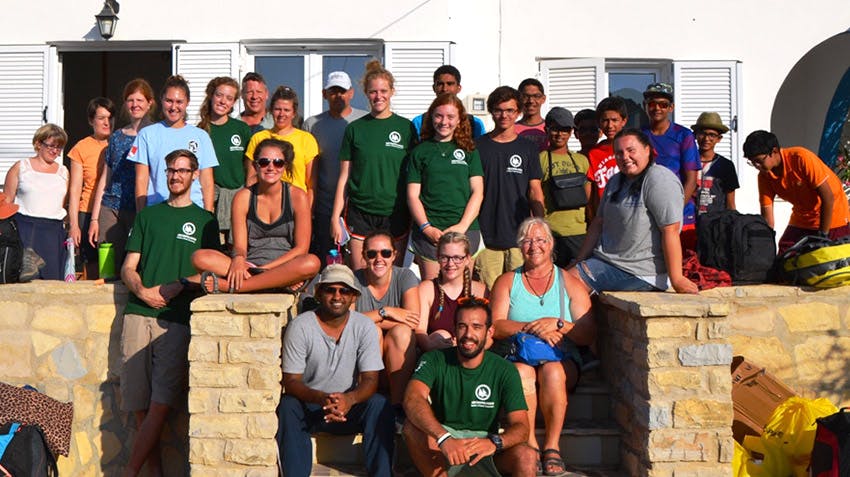
What specific kinds of things can you learn?
Interns have the opportunity to carry out field-work and analyze the data collected - either focusing on their own project or helping out other interns with projects that are already on-going. This lets you explore and learn about diverse fields of research, gaining practical experience that makes you a more valuable candidate for future job opportunities.
This internship allows you to learn directly from staff members whose research specializes in the different fields such as marine mammal research, marine ecology and biodiversity, deep-sea ecosystems, microplastics, GIS, and many more. Interns are encouraged to develop their own projects from start to finish. Many interns are given the opportunity to develop their English scientific writing skills through report writing, and others are also able to develop communication and presentation skills by presenting their work to their peers.
Interns gain useful skills related to research but also interpersonal skills, which are really important when you’re working with diverse teams. Such skills are related to team-working, time management and motivation to complete short and long-term goals.
Interns should come prepared to learn what it is like to be a scientist in their respective field. This means that you can also experience the highs and lows of conservation science. There is opportunity to see real change being made for the purpose of conservation. However, interns also gain realistic insight into the challenges and frustrations which must be overcome along the way. It’s really important that interns prepare themselves to learn solutions-oriented thinking, along with enhanced cultural intelligence, for collaboration across multinational teams.
What are the unique points about choosing to be based in Greece for this internship?
Of course, there is also the culturally immersive aspect of the experience as well! Our institute, throughout the years, has built a precious relationship of trust and mutual respect with locals, so interns who join us are well-regarded with the community. They understand and appreciate the conservation work that we’re all invested in, as the motivation to protect this unique Aegean coastal and marine environment is commonly held. Spending time living on a small island in Greece gives you an appreciation of a simple lifestyle and the importance of being in harmony, both with the environment and the local community.
There is a great opportunity to meet like-minded people here, who are interested in conservation. This program is highly social, and emphasizes the importance of teamwork and collaboration among interns. Beyond working together, interns also live together and many build strong friendships that last a lifetime. As conservationists, most interns are passionate about spending time outdoors, and they spend their free time hiking around the island, going to beaches, and exploring new places!
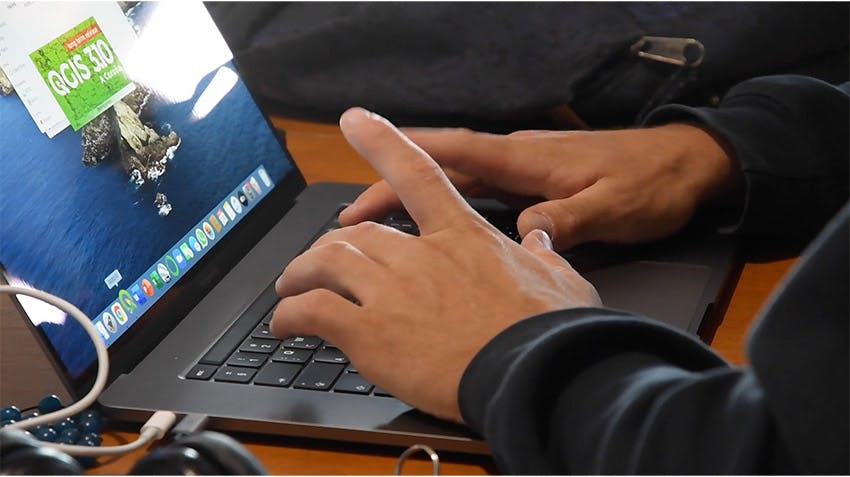
How are interns supported and guided when they’re in Greece?
Our staff on-site is always available for any need. Our interns get full support throughout their experience, including meals and accommodation. Prior to their arrival, the RISEWAYProgram Manager assists with guidance pertaining to their preparations. Through our “Admissions” team, we’re also on-hand to assist with any needs regarding visa procedures (if needed) and travel logistics. Upon arrival, we are here to welcome interns! We show them our facilities and accommodations, and introduce them to our special island community.
What if a participant chooses to intern remotely, if they prefer not to travel to Greece for this experience?
No problem! Our remote internships are designed for people who (for whatever reason) are not able to join us on site but still want the experience of collaboration with an environmental NGO. Remote interns gain useful skills for their careers, for example, through the development of their scientific writing and data analysis skills. These kinds of activities play a major role in the careers of scientists!
How are the remote interns supported?
During the first meeting with a remote intern, they meet their supervisor (online), receive an overview of our NGO, and we plan out their schedule. Remote interns can continue connecting with their supervisor during weekly meetings and complete ongoing support is provided via emails. There is a lot of opportunity for growth and development through the virtual platform - for example, through online conferences, Zoom meetings, etc.
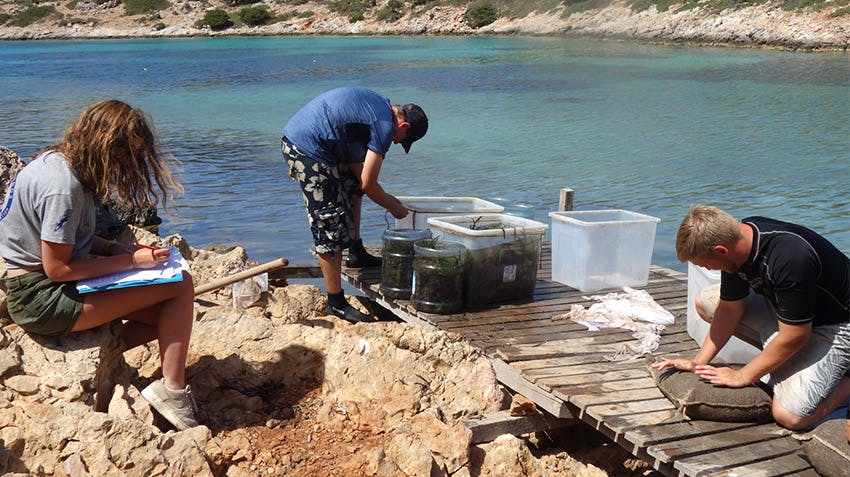
What is the best advice we can give to those who are thinking about interning remotely?
Interning remotely provides the opportunity to begin experiencing how work is carried out at an environmental NGO. If you are looking for an internship with a focus on conservation, we encourage you to get involved. Remote internships offer a global experience and the possibility to continue with marine research in unique environments. We need people willing to make a difference to join our team, so the opportunity is there for people wishing to invest in this future career path. Why do not take advantage of building the right skill sets and networks!
Regardless of whether a participant chooses to intern remotely or on-site, what can short-term interns expect? What can longer term interns expect?
Short-term interns (1-2 months) can expect to gain knowledge on the working environment of an NGO organization, as well as to help their fellow interns to carry out field work and gain experience with data collection and analysis.
Longer term interns are given the possibility to lead a personal project, either developing it from their own ideas or joining an already on-going project, to contribute to the conservation efforts that the team is working on. They can expect to enhance their skills in carrying out field-work as well as with data collection, data analysis and scientific writing.
How can I get started?
Our step-by-step guide on how it works provides you with more information on how to get started. The process is user friendly and there are two options you can take to get the ball rolling.
-
If you’re unsure of which internship program is right for you, you can simply check availability to submit an enquiry which will help us to point you in the right direction. If you want to chat over the phone, you can also find our full contact information here.
-
If you already have an idea of what you want to do, and when you want to do it, you can submit your application. It doesn’t cost anything and won’t take more than 5 minutes. However, your formal expression of interest provides the foundation for us to help you take the next steps.
